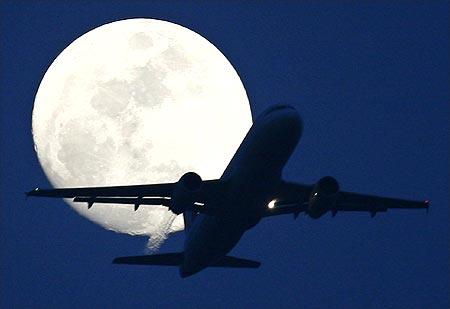
Air India is working on plans to reduce its expenditure on employees by Rs 500 crore (Rs 5 billion) per annum, with a newly formed Committee re-examining wage and other agreements in consultation with the Unions.
The cash-strapped airline's employee cost currently is over Rs 3,000 crore (Rs 30 billion) annually, a company spokesperson said, adding that the airline was now targetting a reduction in employee cost to the tune of Rs 500 crore per annum.
At present, the merged carrier has around 31,000 employees.
So why is the national airline in trouble? Read on. . .
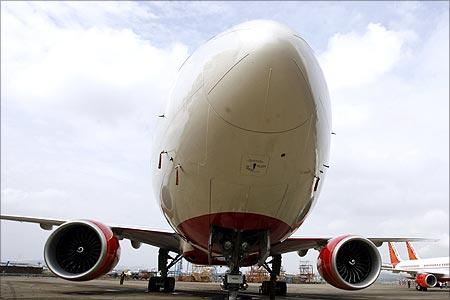
Unprecedented liquidity crunch, high oil prices, widespread economic gloom, declining passenger traffic, skills shortage, and overcapacity are squeezing the life out of India's state-run flagship airline.
Air India has one of the highest number of employees per aircraft.
Media reports say that Air India is losing Rs 14-15 crore (Rs 140-150 million) every day due to declining passenger traffic and low airfares vis a vis the airline's costs.
Airline industry observers say that Air India is the victim of mismanagement and extravagance that have pummelled the airline into the mouth of near-bankruptcy and disrepair. Experts say that management failure coupled with some political interference has been the root cause of the abysmal performance of the airline.
Also, as cost pressures mount and labour productivity remains low, Air India is finding it difficult to compete with the private carriers. Even private airlines, despite their management skills, fewer employees per aircraft and low air fares are fighting for survival as global recession plunges the airline industry into gloom.

One of the six panels set up recently by Air India is the cost rationalisation committee, comprising officials of HR and finance departments.
The committee has been directed to discuss cost rationalisation and reduction of wasteful expenditure with employees' unions and submit its report by July 15.
The spokesperson said that the committee would examine the wage agreements, including those relating to flying allowances and productivity-linked incentives.
The five other committees that have been formed are the committee on integration, committee on green initiatives, committee on safety, committee on customer feedback and route rationalisation committee.
The management has held at least two rounds of talks with various Air India employees unions in this regard, with the union leaders coming up with several suggestions to cut costs.
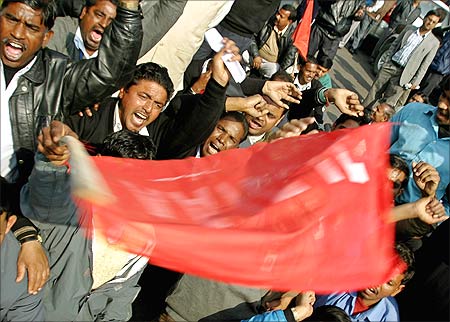
For the first time since losses hit Air India, the carrier announced that the payment of salaries of about 31,000 employees for June will be delayed by a fortnight.
Air India last Friday requested its top management and senior officials to voluntarily forego their salary and productivity-linked incentives for July to help the cash-strapped and crisis-ridden airline.
Air India CMD Arvind Jadhav requested all executives in the level of general managers and above to voluntarily forego salaries and incentives for July as a gesture to ease the liquidity crunch faced by the airline, an Air India spokesperson recently told PTI.
The airline is facing a possible industrial unrest with employees threatening agitation in case their June salary is not given by this month-end.
Jadhav's request is applicable to all senior employees of Air India, its subsidiaries and those on deputation and on contract.
Jadhav in a communique addressed to corporate directors, heads of strategic business units, executive directors and general manages today voiced concern over the financial situation of the company.
He asked the top management to indicate to all employees of the organisation that every single paisa that can be saved needs to be saved.
The appeal by Air India's chairman and managing director Arvind Jadhav followed the threat by employees' union -- the Air Corporation Employees Union -- to resort to an indefinite strike over delayed salaries.
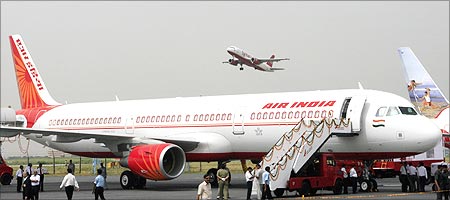
Crisis-hit Air India Chief Arvind Jadhav has said the delay in paying the staff salary has become necessary as the airline is fighting for survival. "This is an hour of crisis. This is a fight for survival.
The survival of our own airline. Jadhav said in a message to National Aviation Corporation India Limited (NACIL) employees. The aviation industry is going through turbulent times.
Yet, Air India, unlike many other airlines, has not retrenched or laid-off of staff till date, he said.
"Air India has only decided to defer salary and PLI for June only by 15 days and requested senior officials to voluntarily forego July salary."
Jadhav said loans from financial institutions at high interest rates cannot be availed endlessly to meet working capital requirement. "Time has come to face the moment of truth in Air India as well."
To tide over the difficult situation, airlines globally have taken harsh and unpleasant decisions, Jadhav said, adding, "We should consider ourselves fortunate that we have been insulated from the adverse impact of the economic slowdown so far."
He cautioned employees about the consequences of disinvestment. "We need to be conscious of the impact that disinvestment/privatisation can have on our own lives, should this materialise."
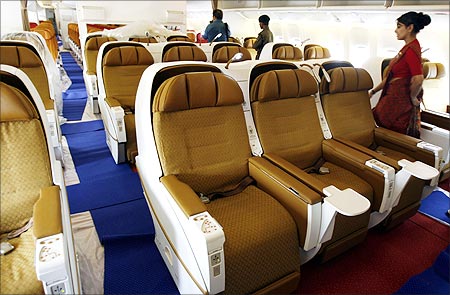
With the national carrier Air India hit by losses, the government would roll out a financial bail-out package for it, Civil Aviation Minister Praful Patel said last week.
Asked about a possible bail-out package, he said, "Well, I think it will happen because as the owner of the airline Air India, the government has its responsibility to put in equity, like private airlines where their promoters put in money."
Asked if the government was looking at a Rs 15,000-crore (Rs 150 billion) bailout, Patel said, "No, no, 15,000 crore is not the number. The number is far less than that."
"I can't give a number, but I can certainly tell you that it has been looked at very actively." he said.
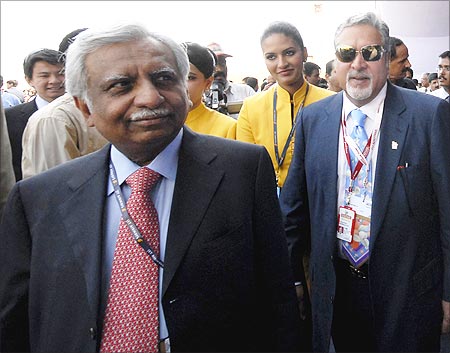
Earlier, soon after taking over for his second innings as the civil aviation minister Praful Patel had said that the government can soon consider an initial public offer for the cash-strapped National Aviation Company of India.
"The issue, however, will not affect the public sector character of the airline," Patel said, but "Air India won't be privatised," he asserted.
The National Aviation Company, which has been incurring huge losses in the wake of the current downturn and falling demand from passengers, is the entity that runs India's flag carrier Air India.
The company has an ambitious fleet-acquisition programme running since the past two years, which will see the induction of as many as 111 new aircraft till 2012 from both the US-based Boeing Aircraft Company and Airbus Industrie.
Patel, who has an independent charge of his ministry in the rank of minister of state, said the money raised by the airline will help in its expansion plan.
"It will bring much needed liquidity," the minister said.

Employees of the cash-strapped Air India on Sunday came up with several suggestions to cut costs during their second round of discussions, as the airline management appealed for tightening of belts to face the acute financial crunch.
The suggestions came as leaders of three major unions, representing almost 70 per cent of the staffers, held a day-long meeting with Air India CMD Arvind Jadhav.
While the unions stuck to their earlier decision to launch an agitation following delay in June salary payment, their leaders said they would continue to hold talks with the management and later review their action plan.
Jadhav sought their help and participation in reviving the airline which is facing acute financial crisis and reeling under a loss of about Rs 5,000 crore (Rs 50 billion).
At the meeting, leaders of Air Corporation Employees' Union (ACEU), Aviation Industry Employees' Guild (AIEG) and Indian Aviation Technicians Association (IATA) suggested that many staffers were ready for transfer to low cost subsidiary Air India Express with lower salaries while others were ready to accept leave without pay for two years.
The CMD spoke about the grim financial scenario facing the airline industry and Air India in particular and sought their support to "fight for survival of our own airline".
The AI management has already asked its top management not to take their July salaries and deferred the June salaries of all employees by a fortnight.
The unions claimed that out of a total salary expenditure of Rs 350 crore (Rs 3.50 billion) by the airlines, only a minuscule 20 per cent were being spent on their salaries, while 80 per cent were being spent on the remaining 30 per cent AI employees.
"Further rounds of talks between the airline management and the unions would be held next week," said J B Kadian, General Secretary of ACEU.
"But we will go ahead with the agitation programme as decided by the three unions. All employees would wear a black badge from June 22 to 25 while on duty, on June 26, we would hold a demonstration at our offices and on June 30, we would be forced to adopt the policy of 'no pay no work' if the management fails to give us our salaries," Kadian said.
Air India's losses for the last financial year are estimated at over Rs 4,000 crore (Rs 40 billion), up from Rs 2,226 crore (Rs 22.26 billion) in the previous fiscal.
The national carrier has approached the government for infusion of funds by way of equity, soft loans and a grant.
The demand has come in the wake of its orders for 111 new planes worth over Rs 45,000 crore (Rs 450 billion) against a puny paid-up capital of Rs 145 crore (Rs 1.45 billion) and authorised capital of Rs 1,500 crore (Rs 15 billion).